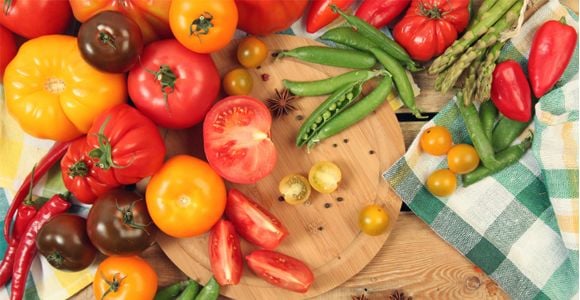Organic food continues its steady growth in America and around the world. Proponents suggest that it is better for the earth, better tasting and healthier -- but what is the truth about organic foods? In the U.S., our food supply has turned from family-operated farms to large-scale farming and livestock operations. The use of pesticides, hormones, synthetic fertilizers and antibiotics are routine. This advancement has led to an abundant variety of foods available at mostly affordable prices in almost every corner of the States. But the changes in our access to food and eating habits have produced a population that is "over-nourished" and at risk of a number of chronic diseases like diabetes, cancer and heart disease. The resulting backlash has created a push for better labeling laws, a desire to return to nutritious whole foods and more sustainable farming practices. Part of this has created a huge market for organic food, reported at $35.1 billion in 2013 and about 4 percent of the total food sales in the U.S. Organic foods are grown without using chemical pesticides, synthetic fertilizers, genetic-modification or ionizing radiation and must promote biodiversity, soil health and biological cycles that maintain or restore ecological harmony.
Organic foods focus on the use of non-synthetic pest controls, permaculture, beneficial insects, natural soil replenishment and organic feed for livestock that is free of hormones and antibiotics. Foods labeled "100 percent organic" have no synthetic ingredients -- organic means that the item is a minimum of 95 percent organic and may use the USDA organic seal. If the label reads "made with organic ingredients," it contains at least 70 percent organic foods. Many labels may also read "free-range," "hormone-free," or "natural," but this does not mean it is organic or has followed the same strict rules.
However, the claim to organic foods being more nutritious than other food is not always true. Food gains its nutrient density based on many variables such as maturity at harvest, soil quality and environmental conditions. This claim is sometimes made based on the use of compost or manure in organic farming practices that may increase mineral content.
There is also evidence that there are some health benefits to eating organic foods, although this continues to be minimal. Since organic fertilizers nourish plants with lower levels of nitrogen and nitrate, the consumption of dietary nitrates decreases. High concentrations of nitrates are considered harmful and related to cancer development. It should also be mentioned that due to polluted groundwater, rain and air, some organic food has residues of conventional pesticides and synthetic fertilizers. To keep these residuals to a minimum, organic crops can only be grown in soil that has been free of prohibited sources for more than 3 years.
But with regards to organic foods being better tasting, flavor continues to be a personal preference. When it comes to deciding whether to consume organic food, one of the biggest disadvantages continues to be the higher cost of organic food. Although due to higher demand of organic foods, the cost has been decreasing and the availability increasing.
Below is a list of some of the foods that tend to have higher contaminants. These foods should be prioritized when purchasing organic:
Fruits
- Apples
- Peaches
- Cherries
- Strawberries
- Pears
- Grapes
- Nectarines
Vegetables
- Potatoes
- Celery
- Sweet Bell Peppers
- Leafy Vegetables
- Spinach
- Lettuce
These foods usually contain less pesticide residue and should be kept in mind with cost constraints:
Fruits
- Bananas
- Kiwi
- Mangoes
- Pineapple
- Avocados
- Papayas
Vegetables
- Cabbage
- Asparagus
- Onions
- Broccoli
- Eggplant
- Sweet Corn
So whether or not you choose to purchase organic food, always aim to buy local produce when possible. To reduce your exposure to pesticides and contaminants, wash and scrub all produce, pull off the outer leaves of your leafy vegetables and remove the peel from your fruits and vegetables. When eating meat and poultry, make sure to remove as much of the skin and fat as you can because pesticide residues are found in higher concentrations.
As our planet continues to grow, there will be more and more research in food technology to better farm and grow more nutritionally dense foods. With the expanding population, it is hard to argue against the need for techniques that make more nutritious foods available to all people. It will be important to stay knowledgeable on food safety and farming methods, and vote with your dollar for which practices you feel are best for your family and the planet. Whether or not that includes organics is up to you to decide.

Emily DeLacey MS, RD is a Registered Dietitian and currently working in Jamaica as a HIV/ AIDS Prevention Specialist. She attended Central Washington University for her Bachelor's Degree in Science and Dietetics and continued on after her internship to Kent State University for her Master's Degree in Science and Nutrition, with a focus on public health and advocacy. She served as a U.S. Peace Corps Volunteer in Malawi 2012-2014 working as a Community Health Advisor in a rural village, immersing in the joys of life without electricity or running water. She has been to 20+ countries and 47 of the 50 states in the US. Traveling, adventuring and experiencing new cultures has made her a passionate advocate for the equality of nutrition and wellness for all people.



